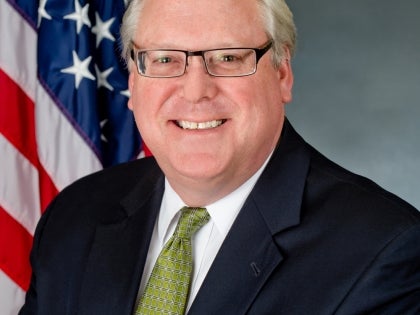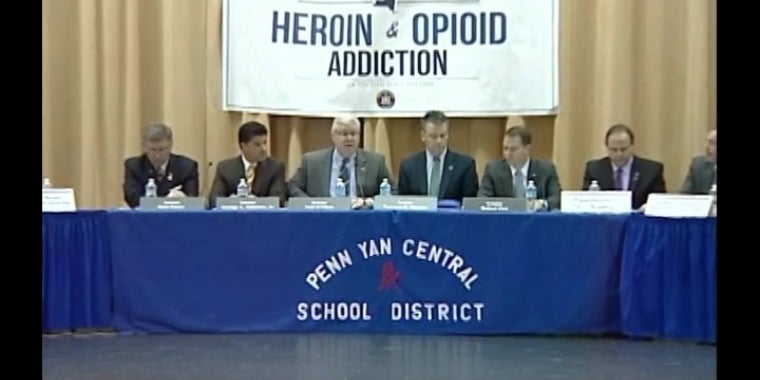
Legislation co-sponsored by O'Mara to strengthen New York's combat heroin efforts being signed into law today by Governor Cuomo ~ Read and watch more

Senator O'Mara sponsored a Task Force on Heroin forum in Penn Yan earlier this year.
Elmira, N.Y., June 22—Legislation co-sponsored by Senator Tom O’Mara (R,I,C-Big Flats), a member of the Senate Task Force on Heroin and Opioid Addiction, to enact a comprehensive new package of anti-heroin initiatives that will continue to strengthen the New York’s prevention, recovery, treatment and enforcement efforts to combat the deadly drug, is being signed into law today by Governor Andrew Cuomo.
[UPDATE, July 21: "O'Mara welcomes new treatment beds at Cayuga Addiction Recovery Services"]
The Senate and Assembly approved the legislation late last week and the governor is conducting bill signing ceremonies throughout the day today in Buffalo, and on Long Island and Staten Island.
“Both the Senate Task Force on Heroin and the governor’s task force focused on direct, local input as the driving force behind these new actions. We heard directly from the local front lines in fighting this heroin crisis and that’s the foundation we’re building on and will keep building on,” O’Mara. “This local input, which has also been reflected in actions we’ve taken over the past several years as well as in this year’s state budget, helps us target the necessary responses and will keep our strategies as up to date as possible. Heroin is devastating lives in Penn Yan, Hornell, Ithaca, Elmira and many other communities throughout the Southern Tier and Finger Lakes regions, and statewide. Local input has been the driving force behind the new actions we’re taking to strengthen the state-local partnership and keep putting in place the most effective combination of law enforcement, awareness and education, and treatment and prevention. We need to keep acting and keep working, and we will."
The legislation (S8139/A10727; S8138/A10726; S8137/A10725) puts in place an agreement between the Legislature and Governor Andrew Cuomo announced two weeks ago.
[As a member of the Senate Task Force on Heroin, O'Mara has sponsored public forums in Penn Yan and Elmira, and attended task force hearings from Long Island to Buffalo. Watch a replay of O'Mara's Penn Yan forum HERE, and a replay of the Elmira forum HERE]
The new laws particularly focus on issues and concerns raised by individuals in recovery, families and treatment providers across the state. Specific parts of the legislation include:
> Ending Prior Insurance Authorization to Allow for Immediate Access to Inpatient Treatment as Long as Such Treatment is Needed: People suffering from addiction who seek treatment need immediate access to services, but prior authorization requirements by insurance companies are often a roadblock to admission to inpatient programs. This legislation requires insurers to cover necessary inpatient services for the treatment of substance use disorders for as long as an individual needs them. In addition, the legislation establishes that utilization review by insurers can begin only after the first 14 days of treatment, ensuring that every patient receives at least two weeks of uninterrupted, covered care before the insurance company becomes involved;
> Ending Prior Insurance Authorization to Allow for Greater Access to Drug Treatment Medications: People seeking medication to manage withdrawal symptoms or maintain recovery must often request prior approval from their insurance company, which slows or stops the individual from getting needed medication. This legislation prohibits insurers from requiring prior approval for emergency supplies of these medications. Similar provisions will also apply to managed care providers treating individuals on Medicaid who seek access to buprenorphine and injectable naltrexone;
> Requiring All Insurance Companies Use Objective State-Approved Criteria to Determine the Level of Care for Individuals Suffering from Substance Abuse: Insurance companies often use inconsistent criteria to determine the covered level of care for persons suffering from substance use disorder, which often creates barriers preventing these individuals from receiving care. This legislation will require all insurers operating in New York State to use objective, state-approved criteria when making coverage determinations for all substance use disorder treatment in order to make sure individuals get the treatment they need;
> Mandating Insurance Coverage for Opioid Overdose-Reversal Medication: Naloxone is a medication that revives an individual from a heroin or opioid overdose and has saved thousands of New Yorkers’ lives. To expand access to this life-saving medication, the new legislation requires insurance companies to cover the costs of naloxone when prescribed to a person who is addicted to opioids and to his/her family member/s on the same insurance plan;
> Increasing Evaluation for Individuals Incapacitated by Drugs from 48 to 72 Hours: Sometimes, individuals suffering from addiction are at risk for overdose and thus pose a threat to themselves. The legislation allows families to seek 72-hours of emergency treatment, an increase from the current 48-hours, for their loved one to stabilize and connect them to longer-term treatment options while also balancing individual rights of the incapacitated individuals.
> Requiring Hospitals to Provide Follow-Up Treatment Service Options to Individuals Upon Hospital Discharge: Hospitals play an important role in caring for individuals suffering from addiction who are often admitted to hospital emergency rooms after an overdose. This legislation requires hospital medical staff to provide discharge-planning services to connect patients who have or are at-risk for substance use disorder with nearby treatment options to provide continuous medical care.
> Allowing More Trained Professionals to Administer Life-Saving Overdose-Reversal Medication:
Overdose-reversal medication such as naloxone saves lives. However, the law does not currently allow certain licensed professionals to administer this medication to individuals overdosing from heroin and opioids. To ensure that more people are able to help reverse overdoses, the new legislation authorizes trained professionals to administer naloxone in emergency situations without risk to their professional license.
> Expanding Wraparound Services to Support Long-Term Recovery: Individuals leaving treatment are at great risk for relapse. To provide services during this critical period, the legislation extends the wraparound program launched in 2014 to provide services to individuals completing treatment including education and employment resources; legal services; social services; transportation assistance, childcare services; and peer support groups.
> Reducing Prescription Limits for Opioids from 30-days to Seven Days: There is a well-established link between the rise in opioid prescriptions and the current heroin crisis. To reduce unnecessary access to opioids, the legislation lowers the limit for opioid prescriptions for acute pain from 30-days to no more than a 7-day supply, with exceptions for chronic pain and other conditions.
> Requiring Ongoing Education on Addiction & Pain Management for All Physicians and Prescribers: Physicians and other opioid prescribers are important partners in preventing addiction linked to abuse of prescription opioids. To ensure that prescribers understand the risks presented by prescription opioids, the legislation mandates that these health care professionals complete three hours of education every three years on addiction, pain management, and palliative care.
> Mandating Pharmacists Provide Easy to Understand Information on Risks Associated with Drug Addiction and Abuse: Consumers may not understand the addiction and abuse risks posed by prescription opioids. To improve consumer awareness about these risks the legislation requires pharmacists to provide educational materials to consumers about the risk of addiction, including information about local treatment services.
> Requiring Data Collection on Overdoses and Prescriptions to Assist the State in Providing Additional Protections to Combat this Epidemic: Current and accurate data is critical to combat the heroin and opioid crisis yet gaps currently exist in statewide data on overdoses and usage of opioid reversal medication. To fill that gap the legislation requires the State Commissioner of Health to report county-level data on opioid overdoses and usage of overdose-reversal medication on a quarterly basis.
The 2016-2017 budget invests nearly $200 million through the New York State Office of Alcoholism and Substance Abuse Services (OASES) to combat the heroin and opioid epidemic -- an 82 percent increase in state spending since 2011. This investment includes $66 million for residential treatment beds, including counseling and support services for roughly 8,000 individuals; $38 million to fund medication-assisted treatment programs that serve approximately 12,000 clients in residential or outpatient settings; $25 million in funding for state-operated Addiction Treatment Centers; $24 million for outpatient services that provide group and individual counseling; and $8 million for crisis/detox programs to manage and treat withdrawal from heroin and opioids.
The new funding will be allocated to add 270 treatment beds and 2,335 opioid treatment program slots across the state to help New Yorkers suffering from substance use disorder and to expand vital treatment and recovery resources. It will also fund additional family support navigators across New York to assist substance users and their families locate and access treatment options and cope with addiction. The agreement will also expand the on-call peer program which partners individuals in recovery with people in hospitals suffering from substance use disorder to help connect these individuals to treatment and other resources upon discharge. The state is also increasing the number of Recovery Community and Outreach Centers and Adolescent Club Houses statewide to provide safe spaces for teens in recovery that deliver health and wellness services for teens and young adults.
O’Mara praised the enacted legislation’s focus on prevention, recovery and treatment. But he expressed disappointment that the new legislative package fails to take further aim at heroin traffickers and dealers, including legislation (S4163) he co-sponsors to allow law enforcement to charge a drug dealer with homicide, a class A-1 felony carrying a penalty of 15-25 years in prison, if a person dies of an overdose of heroin or other opiate-controlled substance sold by that dealer. The measure targets mid- to high- level drug suppliers who profit from heroin sales.
“Awareness and education, prevention and treatment are the fundamental responses. But so are tough laws and law enforcement, especially when it comes to heroin traffickers and dealers. I agree that we can’t arrest our way out of this crisis, but we shouldn’t hesitate to throw the book at the pushers and suppliers of this deadly drug,” said O’Mara. “Unfortunately, the Assembly Democratic leadership consistently refuses to get as tough as we should get on our worst criminals. Local law enforcement on the front lines of fighting this heroin crisis have asked for many of these tougher laws and we should be listening.”
Steuben County District Attorney Brooks Baker, for example, announced last week that local law enforcement in the county will begin investigating drug overdose-related deaths as potential crime scenes.
Baker recently told The Leader in Corning, “There’s been a rash of drug overdose deaths across New York State. And we’ve been hit hard in Steuben County. We’re losing too many good, decent young people to let these things be written off as unintended deaths. And traditionally what has happened is just that.” [Read the full article HERE]
Steuben County Undersheriff Jim Allard added, “If there’s indicators that the death is attributable to illegal narcotic use - specifically opioid use - then we’re going to treat it as a crime scene as you would any other homicide scene.”
O’Mara agreed with Baker and Allard and praised the effort in Steuben County to treat heroin and opioid-related overdose deaths as potential crime scenes.
“I’m behind their efforts one-hundred percent and we’ll keep fighting in the Senate to give our local law enforcement every tool they need to effectively do their jobs to protect our communities and save lives,” said O’Mara.



